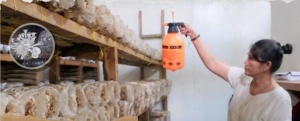
In the Philippines, mushroom cultivation has been gaining reputation as a viable source of livelihood due to its vegan-friendly popularity and nutrient-rich content.
Seeing it as a profitable business, several residents from Barangay San Marcos in Camaligan, Camarines Sur decided to attend a series of seminars and training in 2018 to focus on mushroom farming and food production.
Among the products that they learned to prepare were pickled mushrooms and cookies.
Their dream, however, was hampered when a strong typhoon hit their town in 2019 and destroyed their equipment and facility.
In 2021, the Department of Social Welfare and Development (DSWD), through the Kapit-Bisig Laban sa Kahirapan – Comprehensive and Integrated Delivery of Social Services (KALAHI-CIDSS), included the municipality of Camaligan as one of the localities qualified for the National Community-Driven Development Program Additional Financing (NCDDP-AF).
With a Php456,329 funding from DSWD KALAHI-CIDSS and NCDDP-AF and the local counterpart contribution of the local government unit (LGU), the community of San Marcos decided to prioritize the construction of a mushroom house along with mushroom fungi and amenities as their sub-project.
To maintain the sub-project, the community formed the Alerto Mushroom Growers Association, a 23-member operation and maintenance (O&M) organization comprised of the San Marcos residents.
According to Cristina Olpate, the association’s president and a KALAHI-CIDSS community volunteer, the community-driven development (CDD) strategy helped them to become a unified and effective team.
“Ang CDD ay nagpapalabas hindi lamang ng galing kundi ng pag-unawa at pagtukoy ng bagay na mas makabubuti sa lahat,” the Association president said.
(CDD can bring out not only skills but the ability to comprehend and identify interventions for the good of the many.)
To increase the sales of mushrooms, the organization conceptualized various products aside from raw mushrooms.
“Ang produkto namin ngayon mushroom pickles, kung may nagpapaluto, ‘yong mushroom soup, fried mushroom, pang-ulam, ‘yong tinumtuman, ‘yong Bicol Express,” Cristina explained.
(Currently, our products are mushroom pickles, if there are customers who want to have it cooked, we have mushroom soup, fried mushrooms as dishes, tinumtuman , and Bicol Express.)
According to Cristina, they can harvest at least 800 grams of mushroom and they would earn at least Php6,000 a month. They then use their profit as a rolling budget to buy more fruiting bags.
Within the association, the members also assembled a research and development (R&D) group to work on the innovations and improve their products and processes.
“So sila ‘yong sigeng research, nagse-seminar, pati pag-luto inaaralan nila kung paano pag-luto, ‘yong procedure ng, kasi iba-iba din ang procedure na makikita mo kahit sa YouTube po ng paggro-grow ng mushroom so may mga technique kung ano-ano. So tuloy-tuloy po ‘yon na pinag-aaralan nila, so ‘yan ang pinaka inaalagaan namin ‘yong aming research and development group,” Butch Jacinto, chairperson of the Bids and Awards Committee (BAC), explained.
(They are the ones who research, attend seminars, study cooking techniques, and explore proper growing procedures because there are various procedures we can see on YouTube; hence, they keep on studying and researching. We also really value the Research and Development group.)
Butch also pointed out that the organization is planning to expand its business to supermarkets and fresh markets.
The accomplishments will not be possible without the contribution of each member.
“Ang pagkakaisa ng bawat miyembro upang maisaayos ang nasimulan ay
napakalaking bahagi sa pagbabago,” Cristina ended.
(Cooperation of every member to sustain the early efforts is a big part of the positive change.)
KALAHI-CIDSS is a program that uses the CDD strategy which allows community members to actively participate in identifying and prioritizing their community’s concerns, and allow them to design, implement, and manage solutions to their priority community problems.
The program targets municipalities with a poverty incidence of 21% or higher; vulnerability to disasters; have committed to the local counterpart contribution; or have no duplication of beneficiaries with the Support to Barangay Development Program (SBDP) of the National Task Force to End Local Communist Armed Conflict (NTF-ELCAC).
As of December 2022, sub-projects completed under the program totaled 3,246, which is 84.7 percent of the target for the year.
Almost 50 percent of these sub-projects are located in the Bicol Region (with 929 completed sub-projects) and Central Visayas (with 666 completed sub-projects).#


